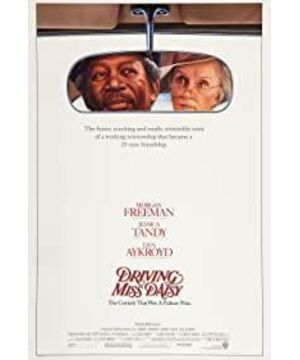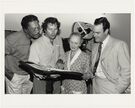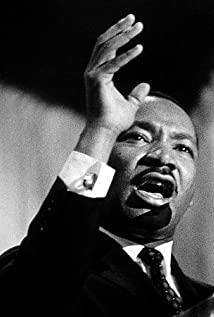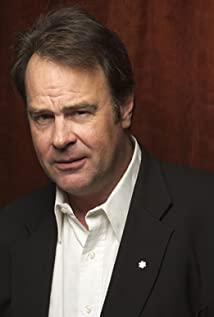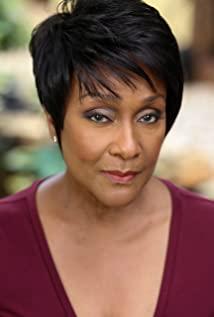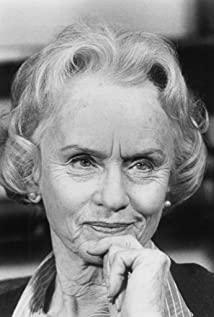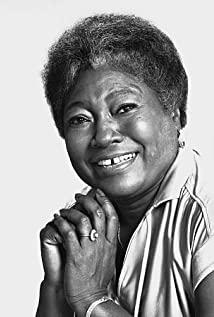Hitler hated the Jews, and Christians also believed that the Jews were the ones who put Jesus on the cross, so the Jews were massacred and discriminated against. In the United States, black women can marry white men, but white women rarely marry black men - this is somewhat similar to the idea of Mr. Fang in "Besieged City": "Marrying a daughter must be better than my family, and marrying a wife must be inferior to my family." Even in the U.S. election, racial issues were brought to the fore by Obama, although his relationship with Wright has added some water to the roaring fire. Whether Obama can realize the "American Dream" of black people and break the ice of black and white remains to be seen. But at least, in "Driving for Miss Daisy", we see the warmth and friendship between blacks and whites, and even a touch of love.
Miss Daisy, 72, was a wealthy Jew whose husband died young. She is kind, arrogant, stubborn, stern, harsh, and even somewhat impersonal. In her sixtieth year, she has an almost perfect dress-a delicate hat, an elegant long dress, and meticulous hair. Only her demeanor can hold back the gorgeous lipstick on the corner of her mouth.
With advanced age, she can no longer drive. Her son invited Hawke (Morgan Freeman), a black driver, for her. It's a bit like a war between two people, she rejects him, he tries to get close to her and serve her well. She didn't like him teasing flowers and plants, she didn't like him saying he was rich, was angry for him waiting for her in front of the church, and even suspected him of tinned sardines. In short, nothing. The old lady's stubbornness and harshness were revealed. But he, like an adult to a child, tolerated all her willfulness and nitpicking. She suspected him of stealing the can, but he told her the next day and bought a new one; he drove her to the grave, she taught him how to read and gave him a textbook on Christmas; he sent her to her Her brother's ninetieth birthday, she told him about her childhood, happy and lovely; when he went to the toilet halfway, she found her dependence on this black driver for the first time; in the early morning of snow, he brought her the sun Everyday coffee...step by step, little by little, they even went to a speech by Martin Luther King Jr. together, though one was in the car and the other in the car. Finally, one morning, she looses her hair and wears pajamas all over the room looking for her homework to correct. When she woke up, she took his hand and said, "You are my best friend."
"Best friend" is probably the best comment. From unfamiliar to familiar, from rejection to acceptance, from resistance to dependence, they have gone through a long twenty-five years. "The love of the elderly is like an old house on fire, and it can't be controlled." Someone once described the love between Feng Yidai and Huang Zongying. In the story of these two old people, there is no affectionate dialogue, no heartfelt confession, but it spreads slowly, like a river flowing, silent and long. All the friendships turned into speechless in the spoonfuls of cakes on Thanksgiving, which directly nourished the heart and lungs.
Morgan Freeman, whether it's the sophisticated prisoner in "The Shawshank Redemption" or the quick-witted old detective in "The Seven Deadly Sins," is masterful. The demeanor of the old opera bones cannot be resisted. In "Driving for Miss Daisy", he is warm and humorous but also cunning - as can be seen from his offer of a raise. His voice was very unaccustomed to hearing at first, a bit sharp, even harsh. Gradually, I discovered that this kind of sharpness is actually a bit helpless, a bit self-deprecating, and a bit optimistic. The police inspected his driver's license and looked at him cautiously. He did not refuse or resist, but there was some disdain and resistance in his mildness; "The toilets at the gas station are not allowed to be used by people of color", such a voice came from him. It came out of his mouth, his face was expressionless, seemingly inadvertent, but it was shocking. The skill of the old opera bones is evident.
The old maid, Adina, died suddenly, without warning and without pain, while peeling beans and watching TV. Her face lying in the church was peaceful and serene. The voice of the choir resounded like the sound of nature. Even the saddest moments in the film are poignant and calm. On a snowy morning, when they were holding the coffee they bought from the store, they began to cherish the memory of the old black maid who had accompanied them for more than ten years. "You can make Adina-flavored chicken wings and Adina-flavored biscuits, but you can't make Adina-flavored coffee." From the simple dialogue, deep sorrow emerged. People who leave without signs and pains are actually happy, at least they don't need to be afraid and don't need pain.
The rhythm of the film is soothing and the music is relaxing and pleasant. The car drives by on the road, the picture is a typical golden section, a yellowish swaying wheat field, the car runs in the middle, it is a very comfortable sensory enjoyment. Whether it is full of flowers in spring or white snow in winter, it is so beautiful. She invited her son to listen to Martin Luther King's speech, and the picture processing was very clever. The old woman sat quietly, while her son moved. His movements are reflections in the standing mirror. The foreground and background are moving and still, but they are unexpectedly merged in the reflection of the mirror. Miss Daisy is getting old, but the house remains the same. Elegant wallpaper, old furniture, empty house, black and white photos, a set of stagnant empty shots, but not monotonous. The time of the old man's life flows quietly in such a house.
A touch of warmth pervades it, making it impossible to hide. A beautiful time, the screen is dense, and the heart begins to warm.
View more about Driving Miss Daisy reviews


